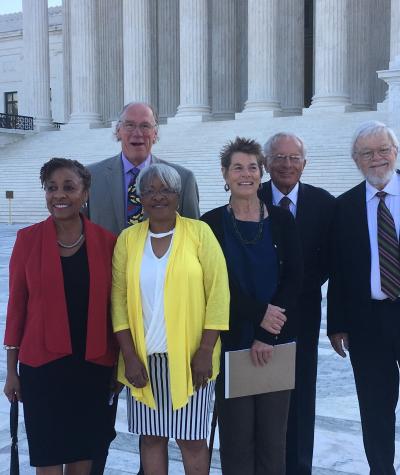Meet the plaintiffs in the landmark partisan gerrymandering case, Gill v. Whitford
Bill Whitford
Bill Whitford, born and raised in Madison, Wisconsin, was an engaged citizen from a very young age thanks to his politically active mother who “was head over heels for Adlai Stevenson!” At 14, he was too young to vote, but not too young to knock on doors and stuff envelopes with his mother. Bill studied at the University of Wisconsin at Madison where he became president of the campus Young Democrats.
Although he’s lived in Nairobi, New Haven, and Tanzania, “I never really left Madison. This is where my family, friends, and community are.” He remained politically active while raising four children and teaching young law students for 40 years. Bill has six grandchildren between the ages of 4 and 12.
The redistricting of 2011 became a topic of conversation among Bill and a number of friends who met regularly at a Milwaukee tearoom to discuss politics. When Whitford saw that Democrats got a majority of the vote for the assembly statewide in 2012 but won only 40% of the seats, he was strongly motivated to become part of the lawsuit.
Emily Bunting
Emily Bunting has lived in Wisconsin for 26 years. She raised her children in a rural community in Richland county. There she works as a small organic farmer, raising greens in a high tunnel from fall through spring.
Her parents met after World War II while doing reconstruction work in Italy so she grew up in a family that was always socially and politically active. “I’ve always voted,” Emily says, “But now I feel that my vote doesn’t count.”
In 2011, the redistricting plan drawn by Republicans “cracked” Emily’s district, placing her family within the Democratic minority in a new district and a new community with a new representative.
As a result, her ability to make an impact in local affairs is diminished. She’s called and written her representative about issues in the district, including deteriorating roads, inadequate school funding, and potential groundwater contamination – to no avail. Emily says, “Our state representative used to answer our phone calls, and now he won’t. Before the redistricting, people could organize and fight...in our old district, we at least had some kind of impact.”
Helen Harris
Helen Harris’s father came to Milwaukee from Louisiana in 1948 as part of the great African-American migration north, and worked at American Motors. Helen and her cousins were the first of their family to graduate both high school and college. She became an educator, working first as an elementary school teacher, then an administrator, and finally as a school principal. Since her retirement, Helen has been volunteering at three schools – including the high school she graduated from and the school her grandchildren attend.
Participating in democracy is a value deeply instilled in her by her parents. Helen has proudly voted in every election from school board to governor.
A lifelong Democrat, Helen has always lived in one of Milwaukee’s three majority black and Democratic State Assembly districts on the northwest side of Milwaukee. After the redistricting of 2011 placed Helen and her neighbors in a suburban district, Helen found that not only did her new representative not respond to her phone calls and letters, but she didn’t even campaign in her neighborhood.
“I feel voiceless,” says Helen. “I don’t feel connected to my district or representative anymore.”
Wendy Sue Johnson
Wendy Sue Johnson loves knowing everyone in Eau Claire, where she was born and raised, and where she raised her own two children. “I have deep connections here,” she says. “My dad was part of the high school’s first graduating class. I was part of its 25th class, and my daughter was part of its 50th!” Now enjoying a second career as a family law attorney, Wendy is a former teacher and mother of two who cares passionately about education and served two full terms on the local school board.
As a result of the 2011 redistricting, Democratic voters were “packed” into Wendy Sue’s district, making nearby districts significantly easier for Republicans to win. Many of Wendy Sue’s neighbors now live in a different district - in fact the boundaries separating Wendy Sue’s house from other districts runs along the side of her home and immediately across the street from her side door.
Wendy Sue is worried about candidates who don’t need to compete for votes and representatives who can afford to become unresponsive to voters. “When representatives have to work hard for your vote, once elected they need to listen to a variety of opinions, and hear all sides. Now there’s little accountability.”

